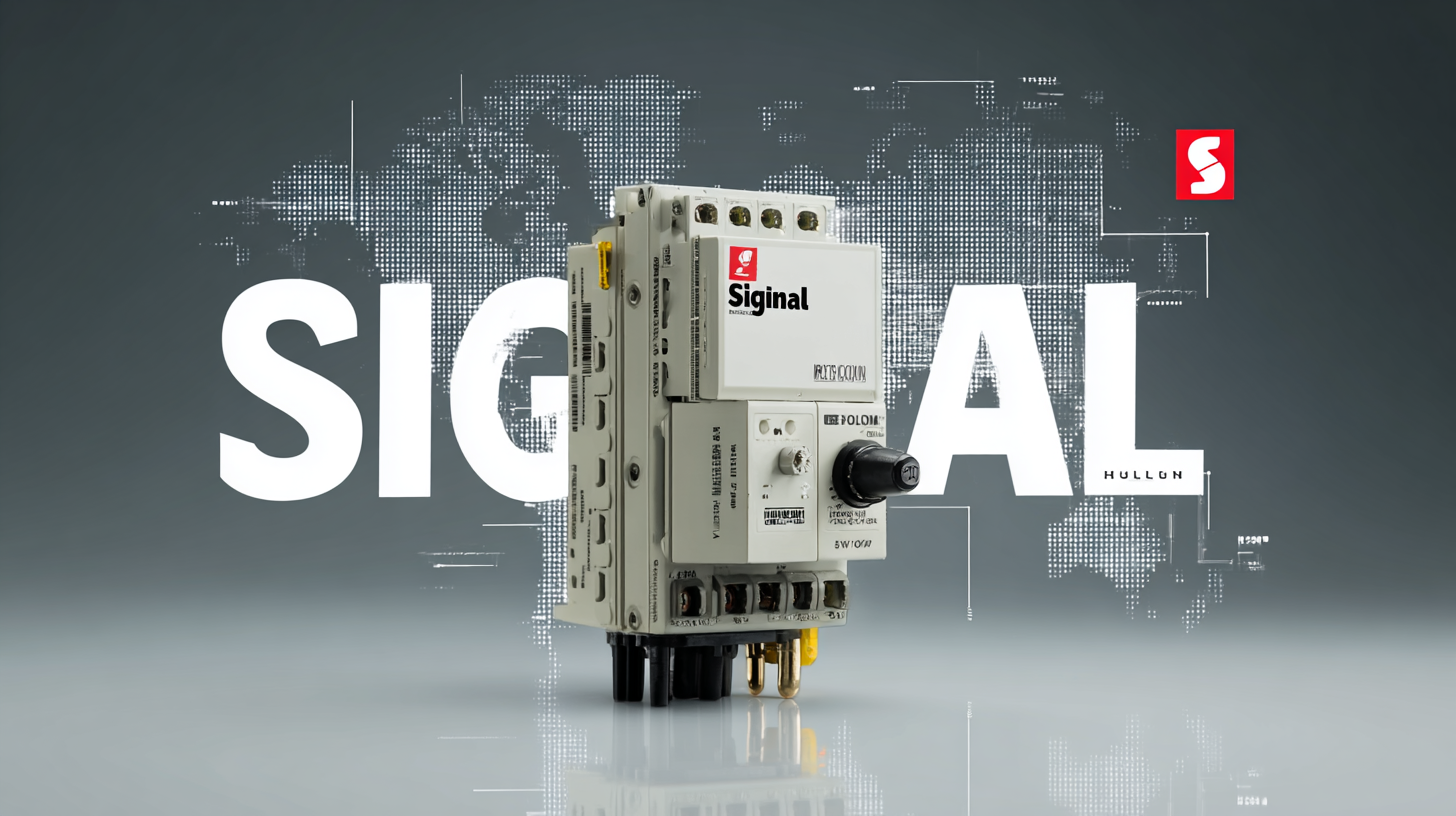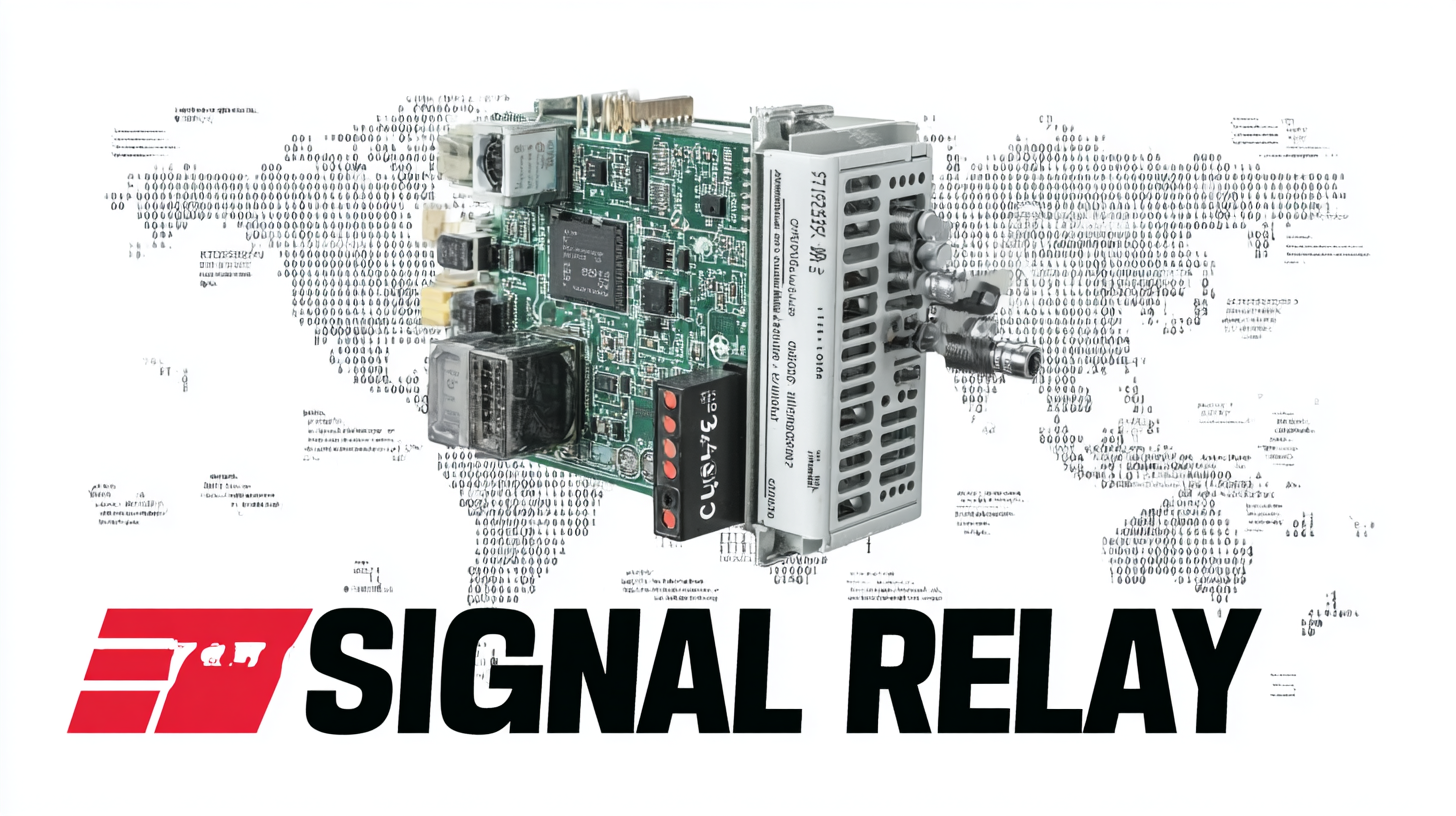In today's interconnected world, the efficiency of your supply chain can hinge on the most minute details, such as the choice of components in your systems. Among these essential components, the Signal Relay stands out as a critical element that can significantly influence performance and reliability. Whether you are managing a complex global supply network or streamlining operations in a local setting, selecting the best Signal Relay is paramount for ensuring flawless communication and operational integrity. This blog will explore five compelling reasons why investing in the right Signal Relay can not only enhance your supply needs but also drive your business toward greater success. Join us as we delve into the specific advantages that the best Signal Relay can offer, ensuring that your global supply chain remains robust and responsive in an ever-evolving market landscape.

In today's interconnected world, the importance of quality signal relays in global supply chains cannot be overstated. Signal relays act as crucial components that ensure the seamless transmission of signals throughout various systems, contributing to operational efficiency and safety. When supply chains span across continents, the reliability of these relays becomes even more critical, as they directly affect the speed and accuracy of communications.
Tip: Choose signal relays that are designed for the specific environment in which they will operate. Different regions may have distinct temperature ranges, humidity levels, or electromagnetic interference, all of which can impact relay performance. Selecting environment-appropriate components enhances longevity and reliability.
Moreover, investing in high-quality signal relays minimizes the risk of disruptions in the supply chain. Faulty relays can lead to communication failures, resulting in delays and increased costs. By prioritizing quality, companies can ensure that their supply chains remain robust and responsive to challenges.
Tip: Regular maintenance and testing of your signal relays can help identify potential issues before they escalate. Implementing a proactive approach ensures that all components are functioning optimally, thereby safeguarding the integrity of your supply chain operations.
When selecting a signal relay for global supply needs, understanding the key features is essential to ensure reliability and efficiency. High-quality signal relays typically offer features such as low power consumption, fast switching speeds, and robust insulation resistance. According to a research report by MarketsandMarkets, the signal relay market is projected to grow from USD 2.5 billion in 2020 to USD 3.4 billion by 2025, emphasizing the increasing demand for these critical components across various industries.
One crucial tip is to choose relays with a comprehensive operating temperature range. This is vital for applications faced with extreme environmental conditions. Additionally, look for relays with a proven track record in critical applications, such as telecommunications and medical devices, where reliability can make a significant difference. It's also advisable to consider relays that meet international standards, as they ensure consistency and quality across different markets.

Furthermore, evaluating the relay’s contact configuration can prevent future compatibility issues. Opting for versatile designs that allow for multiple configurations will expand usability across your projects. A report by Transparency Market Research suggests that advancements in relay technology are enabling greater integration with smart systems, making features like remote monitoring significant selling points in today’s market.
When selecting signal relays for global supply needs, assessing reliability is paramount. The right signal relay not only ensures seamless communication between devices but also adheres to industry standards that guarantee safety and performance. Start by researching manufacturers who provide detailed specifications and certifications for their products. Understanding standards such as ISO, IEC, and UL can assist in determining the relay's capability to perform in your specific application without compromising on quality.
In addition to certifications, consider the environmental factors your relays will encounter. For instance, choose relays that are designed for various temperature ranges and have resistance to moisture or dust, depending on your operational requirements. Testing the relays in realistic scenarios before full-scale deployment can prevent potential failures. Engaging with industry experts for insights can greatly enhance your understanding and help you make informed decisions, ensuring the selected relays not only meet but exceed your operational expectations.
| Criteria | Description | Importance Rating (1-5) |
|---|---|---|
| Reliability | Ensure long-term stable operation with minimal failure rates. | 5 |
| Compliance | Meet international standards and regulations to ensure safety and quality. | 5 |
| Durability | Built to withstand harsh environmental conditions for prolonged use. | 4 |
| Versatility | Compatible with a wide range of electrical systems and applications. | 4 |
| Cost-Effectiveness | Provides optimal performance at a reasonable price, ensuring value for investment. | 5 |
When it comes to selecting the right signal relay for your global supply needs, the debate between cost and quality is pivotal. While it’s tempting to opt for cheaper alternatives, sacrificing quality can lead to increased operational costs in the long run due to failures and inefficiencies. High-quality signal relays may come with a higher upfront cost, but their reliability can save you from unexpected downtime and the associated costs of repairs and replacements.
Tip: Always conduct a thorough assessment of the total cost of ownership. Consider not just the initial purchase price, but also the maintenance, potential failure rates, and the longevity of the product. Investing in durable signal relays can lead to lower overall expenses.
Another important consideration is ensuring that your chosen signal relay aligns with industry standards and certifications. This not only enhances reliability but also minimizes the risk of compliance issues. Look for suppliers who provide detailed technical specifications and are willing to demonstrate the quality of their products through testing.
Tip: Establish a relationship with a trusted supplier who understands your operational requirements. They can help guide you toward the best products that fulfill both your budget constraints and reliability needs, making your procurement process smoother and more efficient.
When considering the procurement of signal relays for global supply needs, the evaluation of supplier support and warranty terms becomes critical. A robust warranty serves not only as a safety net but also reflects the manufacturer's confidence in their product. For example, a recent industry report noted that 78% of purchasing managers value extended warranty options as a significant factor when selecting suppliers. This assurance can minimize risks associated with product failures in a dynamic supply chain environment.

Additionally, supplier support is paramount in ensuring the longevity and efficiency of signal relays. As businesses increasingly rely on automation and connectivity, the demand for real-time assistance and technical support has surged. According to a study, 64% of organizations reported that rapid response times from suppliers directly influenced their operational performance. Suppliers that provide comprehensive support—such as technical training and troubleshooting—tend to foster stronger partnerships, leading to improved supply chain resilience. Investing in suppliers that prioritize support and favorable warranty terms can significantly enhance your operational capabilities and mitigate potential disruptions.
TradeManager
Skype
VKontakte

